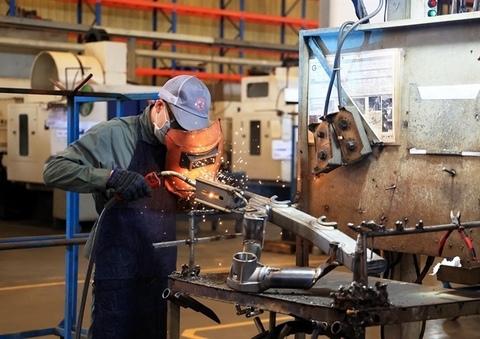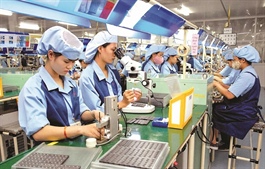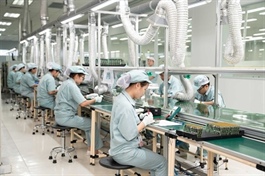"Copycat layoffs" won't do the tricks
"Copycat layoffs" won't do the tricks
Just because many companies are shedding staff by thousands amid the economic downturn doesn't mean others should follow suit.

A worker welding a metal component in Giang Điền Industry Park, Đồng Nai Province. The economic downturn continues to bite into companies' bottom lines, sparking rounds of layoffs. — VNA/VNS Photo Hồng Đạt |
According to Agency for Business Registration, the economic downturn has hit so hard that over 100,000 companies either ceased operations or waited to be dissolved in the first six months of 2023.
Mass layoffs were running rampant in the real estate sector and creeping into others, including IT and e-commerce. From September 2022 to May 2023, three in every 10 Vietnamese companies had to trim ranks to cut costs, resulting in a 13 per cent drop in the labour force.
The picture was not any brighter in a recent Navigos Group report, which shows that 30 per cent of companies opted for downsizing to weather the storm, whereas 41 per cent held steady to bide for time.
But it's not all doom and gloom. Around 25 per cent went against the flow by scaling up their production amid the downturn.
The figure says a lot about how companies were changing the way they deal with dwindling revenues: optimising the workforce to avoid the pain of layoffs.
Thanh Nguyên, Executive Director of the Anphabe, said layoffs might seem like a quick and effective short-term solution, but would come at higher costs in the long term, especially in terms of employee loyalty and productivity.
Suntory PepsiCo Vietnam Beverage understands that and has used digital technologies to streamline its operation rather than taking the easy way out. Its digital efforts have helped save 4,000 working hours per year and double its revenues.
BAT Group employed time management applications and a "meeting-free days" policy to improve its efficiency and cut meeting time by 63 per cent. Less time for meeting bloat means that more time could be used for productive activities.
Schneider Electric Vietnam went so far as to use education and training to change the mindset of its employees to improve their performance. 90 per cent of its staff will reportedly undergo the mindset-changing process until 2025.
Nguyễn Thị Thu Hòa, Director-General of the ADP Group, said a balanced employer-employee relationship creates a mutual win. Therefore, a well-developed employee care policy would help companies to reap optimal benefits productivity-wise.
"Only by mutual respect and working together toward a common goal can they overcome the challenges and achieve success," said Hòa.
Economist Võ Trí Thành told Việt Nam News that layoffs will continue unabated until the end of this year but decelerate in the next thanks to the global economic recovery and the effects of favourable policies.
Export-linked manufacturing would be the sector most hard-hit by the downturn whereas services would come out of it better off, buffering its impact on the labour market.
He suggested education and training be top of mind for the companies that aim to weather the downturn without cutting headcounts on the payroll.
"Companies should launch education and training programmes to better prepare their employees for the turbulence in the labour market," said Thành.
Navigos Group's report shows that amid the downturn 56 per cent of companies in the high-tech sector made redundancies to stay afloat. The figures for agriculture, consumer goods, construction materials, and automobile sectors were 38, 38, 34, and 52 per cent, respectively.























